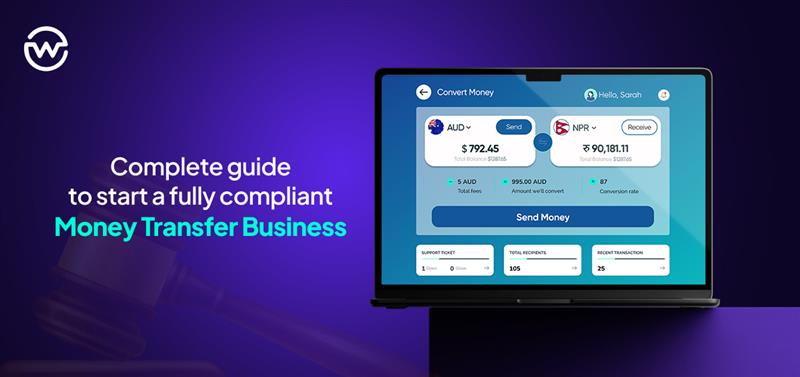Starting a money transfer service is not as simple as moving funds from one person to another, as it may seem to those unfamiliar with the industry. Since multiple countries can be involved, each with its own intricate regulatory framework, the whole money transfer business framework is a little complicated itself. Nevertheless, once a business maps out these regulations and ensures regulatory compliance on each aspect of its business, offering a regulatory-friendly money transfer solution becomes entirely achievable.
In this guide, we will outline all of the steps necessary for a business to start providing money transfer services in compliance with the regulations. Read till the end to get clarity on the roadmap to follow.
Why Does Regulatory Compliance Matter for a Money Transfer Business?
For every international money transfer business, ensuring regulatory compliance is a non-negotiable requirement. But why is it so critical? Here are the key reasons every remittance business should incorporate compliance into its core operations:
- A regulatory-friendly remittance platform instills trust among customers and builds a strong reputation in the market.
- Compliance delivers a certain degree of safety to the operational and financial transactions on the money transfer platform.
- With compliance, remittance businesses can secure their business and customer data from fraud or other risks.
- It is much easier to outperform competitors for a business that abides by the legal regulations and delivers safety to its customers.
- As regulating authorities overseeing money transfer businesses necessitate compliance, businesses can avoid non-compliance legal issues such as hefty fines, license revocation, business closure, or even major legal penalties.
- Compliance acts as an extra level of security along with other safety protocols that are integrated into the remittance platform.
Business Guide To Launch A Regulatory-Friendly Money Transfer Business
Follow this complete process mentioned below when starting a money transfer business and keeping it regulatory-friendly as well:
Step 1: Define Your Business Model
Before getting into the licensing and regulations, your business needs to have a solid business model. Do good research and filter down the options that really align with your business objectives.
Here are some of the criteria that can help shape your business model:
- Target Market: You need to decide whether you wish to assist just businesses, families, or both in transferring money across borders.
- Transfer Method: Does your money transfer platform focus on online transfers, mobile apps, or physical agent locations?
- Payment application: Do you wish to have a remittance application that is mobile-based, web-based, or both?
- Revenue Model: Would you charge for each platform transaction or run a subscription service?
- Geographical Scope: Which countries or states will your business operate in?
Step 2: Understand the Legal Framework
The region in which your business operates has a direct influence on the regulations it needs to abide by. Although it is essential to consider both local and international laws, some countries have more licenses and regulatory complications than others and demand the most advanced infrastructure for the same.
Thus, again, “research is the key” to selecting a region that is both practical and viable for offering money transfer services. We have outlined the licensing requirements and regulatory bodies for several countries. Check them out!
Money Transfer Business In India
The Reserve Bank of India (RBI) is the main governing body that oversees all the money transfer businesses in India. A legitimate money transfer license in India is an absolute necessity if you wish to start a money transfer company in the country.
Now, based on the remittance service, you can apply for a Full-Fledged Money Changer (FFMC) license or an Authorized Dealer (AD) license. These licenses provide the legal authority and ensure compliance with national monetary laws.
Money Transfer Business In USA
Any business operating a money transfer business in the United States of America needs to consider federal, state, and local regulations. Basically, regulating authorities such as the New York Department of Financial Services (NYDFS) and the Department of Financial Protection and Innovation (DFPI) supervise the remittance businesses in the country.
Additionally, federal bodies, including the Financial Crimes Enforcement Network (FinCEN) and the Consumer Financial Protection Bureau (CFPB), require businesses to follow their regulations as well. Thus, you need to file for a state-specific Money Transmitter License (MTL) by registering with the FinCEN to provide money transfer services. Furthermore, when transferring money across borders, adherence to the Office of Foreign Assets Control’s (OFAC) sanctions regulations and the Bank Secrecy Act (BSA) is required.
Money Transfer Business In the Arabian Region (GCC)
In the Arabian Region, it is illegal to conduct international money transfers without obtaining a Central Bank license specific to each country. In some GCC countries, a separate money exchange license is also required.
Depending on the country, different authorities supervise the money transfer businesses. For example, in the UAE, money transfer businesses may fall under the jurisdiction of one of three regulatory bodies:
- Central Bank of the UAE
- ADGM (Abu Dhabi Global Market)
- DIFC (Dubai International Financial Centre)
Now, each authority has its own licensing procedures, compliance requirements, and operational rules. Make sure to review and follow all of the regulations in your chosen jurisdiction.
Money Transfer Business In Southeast Asia
In Southeast Asia, the different regulatory bodies are responsible for supervising remittance businesses, which vary by country. For example:
- Singapore: The Monetary Authority of Singapore (MAS) regulates money remittance companies under the Payment Services Act (PSA). A company cannot provide money transfer services in the country until it has obtained the appropriate MAS Payment Services License.
- Malaysia: Bank Negara Malaysia (BNM) oversees remittance operations in the country. It demands that businesses hold the appropriate and active license under the Money Services Business Act (MSBA) to operate legally.
Money Transfer Business In Europe
To operate a money remittance business in Europe, a company typically needs to obtain an Electronic Money Institution (EMI) license or a Payment Institution (PI) license, depending on the scope of services. However, this license mandates the license-holding enterprise to have a physical presence in one of the locations of Europe and have maximum resources to operate the EMI. Depending on the European nation, various authorities, including the Financial Conduct Authority (FCA) in the UK and BaFin in Germany, offer licensing and oversee compliance.
Note: Licensing timelines also vary from country to country, and some international licenses even take months. Therefore, it is preferable to plan accordingly.
Step 3: Build Compliant International Money Transfer Software
Your business would need robust money transfer software that can work efficiently to provide smooth money transfer services. It should have key features such as multiple currency support, currency exchange capabilities, real-time tracking, and timely notifications. Regulatory compliance tools and secure payment processing are necessary to ensure the platform’s compliance and security. Thus, the software should incorporate essential safety protocols and compliance mechanisms, including AML (Anti-Money Laundering) and KYC (Know Your Customer) verification, Two-Factor Authentication (2FA), end-to-end encryption, and AI-powered fraud detection algorithms.
To develop money transfer software, you can either opt for in-house development or outsource development to a money transfer software development company like Webcom Systems. From ideation to development and launch, compliance and security should be considered to build fully compliant money transfer software.
Step 4: Stick to Compliance Requirements
Following its launch, the company must adhere to nation-specific compliance requirements, such as:
| Region | Key Compliance Requirements |
|---|---|
| India | – Adhere to RBI guidelines – Follow KYC and AML measures on the platform – Keep a complete record of all remittance transactions – Conduct regular audits to ensure compliance with regulations – Report suspicious transactions to FIU-IND – Maintain complete transparency in fees, exchange rates, and delivery timelines |
| United States | – Perform and monitor yearly safety audits – Report suspicious activities by filling out an SAR – Adhere to the Remittance Transfer Rule – Maintain surety bonds – Maintain complete transparency in fees, exchange rates, and delivery timelines |
| Southeast Asia | – Follow regulations advised for digital payment platforms – Implement advanced security protocols to prevent crime or fraudulent transactions – Maintain complete transparency in fees, exchange rates, and delivery timelines |
| Arabian Region (GCC) | – Monitor platform transactions to spot any illegal activity – Maintain a complete record of all transactions carried out through the platform – Stick to customer rights when delivering remittance services |
| Europe (EU) | – Adhere to Payment Services Directive 2 (PSD2) standards – Participate in SEPA for EU payments – Comply with Fifth Anti-Money Laundering Directive (AMLD5) – Protect customer data under EU GDPR |
Thus, not only is it necessary to build a compliant money transfer platform, but compliance in all business operations is also required to maintain the legal license to provide money transfer services. Furthermore, stay up to date on any changes to these regulations in order to remain compliant at all times.
Wrapping Up
Indeed, starting a fully compliant money transfer business requires a lot of work, but it is necessary too! Although if you find the process a little overwhelming, Webcom Systems can assist you. Our team of experts can not only assist you in developing robust money transfer software equipped with advanced security and compliance features, but they can also guide you through the licensing requirements. We even provide white-label money transfer solutions to help you launch quickly and efficiently. Get in touch today to get started!
Recommended Read: White Label Remittance Software is the Future of FinTech




